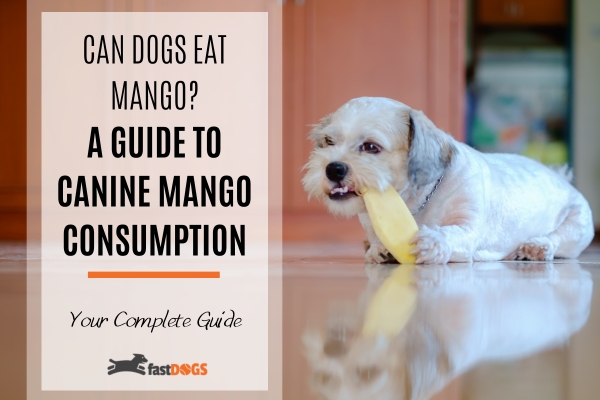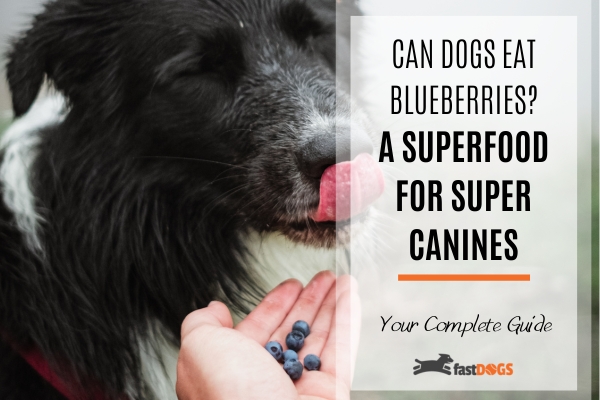Can Dogs Eat Corn? A Kernel of Truth About Corn
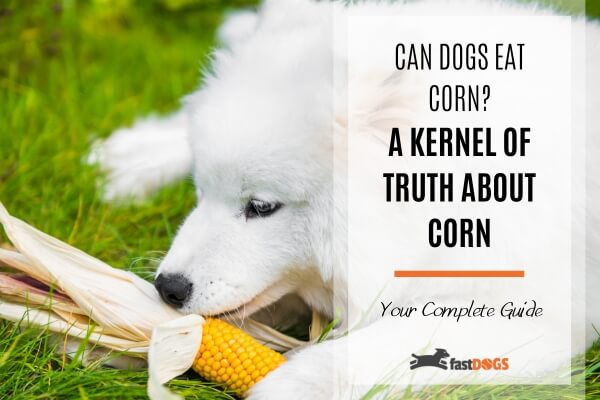
Can Dogs Eat Corn? A Guide for Pet Owners
Corn is one the most common and least expensive staples in the world — and it’s darn tasty too! Whether it's sweetcorn, cornflakes, or popcorn, we all enjoy corn at some time, but what about our canine companions, can dogs eat corn?
With its many forms, can it offer any benefits to your four-legged best friend?
Can Dogs Eat Corn? Contents
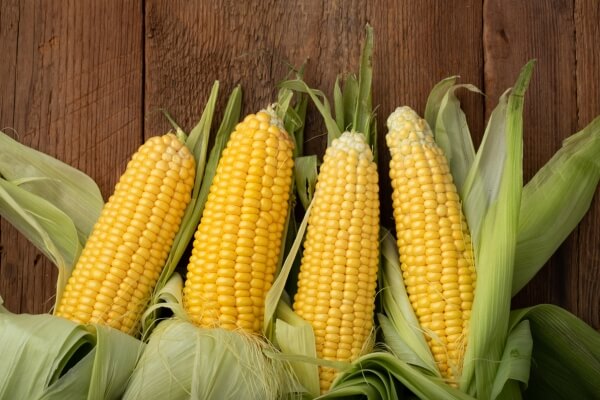
Can Dogs Eat Corn?
If you look at the packaging of many popular dog food brands, you will often see corn listed in the ingredients, but can dogs eat corn as a snack or a treat?
The answer is YES!
But there are certain caveats — corn should only be served to your pooch in moderation, and it should always be served minus the cob.
Corn can offer nutritional benefits for your pup. However, it can also pose some potential risks, including choking, intestinal blockage, or allergic reactions.
Is Corn Good for Dogs?
Although many pet food manufacturers add grains to their products because of the low cost, corn is more than a filler ingredient.
As part of a well-balanced diet, corn can offer the following health benefits.
Protein — Helps maintain healthy muscles while offering benefits to a dog's skin and hair.
Carbohydrates — Although this macronutrient gets a bad rap, it’s important for providing a dog with energy. As a wholegrain, corn is a high-quality complex carbohydrate that provides your pup with a steady supply of fuel.
Linoleic Acid — An omega-6 fatty acid that dogs cannot produce themselves. Linoleic acid is essential for a dog's growth. It can also help to maintain healthier skin, a glossy coat, and an improved immune system.
Antioxidants — Antioxidants include beta-carotene and vitamin E. These support your pooch’s immune system and protect their cells from oxidative damage — in fact, corn has the highest antioxidant activity of any grain!
Fiber — Rich in fiber, corn supports digestion and promotes better gut health.
Magnesium — Benefits the bones and muscles of your dog.
Potassium — Improves your canine’s metabolism and kidney function.
However, remember moderation is key. Overdoing the carbs can lead to obesity, gastrointestinal issues, and potentially diabetes.
When Is Corn Bad for Dogs?
One of the things many owners worry about when introducing a new food to their furry friend’s diet is food allergies.
Surprisingly, dogs have a higher likelihood of developing allergies to beef, chicken or wheat than corn. Research suggests corn appears to be a very rare source of allergens in dogs and cats.
Taking it one step further — cornstarch has been found to have fewer allergens than the flour or kernels of corn. So, if you suspect your dog has a corn allergy, pet foods that have this starchy ingredient as a source of carbohydrates are preferable!
Although uncommon, allergies or intolerance to corn or other grains may cause your pup to suffer symptoms like:
Constant itching/scratching.
Reoccurring ear or skin infections.
Gastrointestinal issues.
If after feeding corn, you notice any of these signs, stop feeding it and consult your vet.
However, the main risks of feeding your dog corn are from the following:
Can Dogs Eat Corn Cobs?
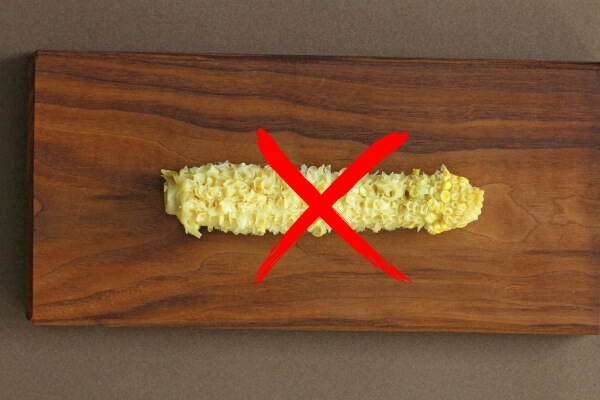
In a word, NO!
The tough, fibrous corn cob is difficult for a pooch to bite through, just as it is for us humans. Trying to consume the cob can lead to:
Choking Hazard
You should always remove the kernels from a cob before feeding corn to your pooch. It can be a choking hazard for dogs of all sizes, and can cause irritation and damage to your dog's stomach lining.
Blockage
The cob isn’t digestible and can lead to an intestinal blockage. Just Google it, and you'll find plenty of horror stories relating to dogs undergoing surgery to extract a stuck cob — some even needing the damaged part of their intestine removed.
Signs of a blockage in your pooch include:
Vomiting.
Diarrhea.
Abdominal pain.
Loss of appetite.
Lethargy.
Straining while trying to poop.
If you suspect your dog has eaten a corn cob, contact your vet immediately.
Can Dogs Chew on Corn Cobs?
Throwing your pooch a cob to chew on quietly under a table at your next backyard BBQ may seem like a good idea. However, if they try to bite off a chunk, it can be harmful if they then try to eat it.
As we mentioned above, your dog runs the risk of choking. And, although larger dogs may sometimes pass a corn cob uneventfully, for medium or smaller dogs, the risk is far greater.
What’s more, even holding the cob to let your dog nibble off the kernels isn’t a good idea. As your dog gets more excited, they may get the corn stuck between their teeth or choke on the kernels.
Can Dogs Eat Corn Husks?
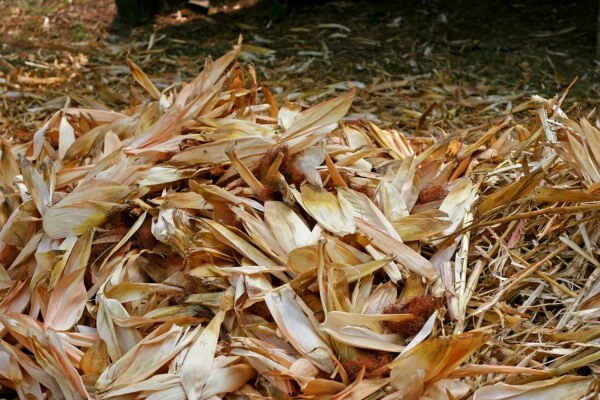
Dogs shouldn’t be allowed to eat or chew on the husks either. If your pooch swallows one, it can cause digestive issues, stomach upset, diarrhea, and in the worst-case scenario, intestinal blockages.
The husk of corn can present a choking hazard, especially for those pups who tend to gulp their food, plus the sharp edges can lead to painful cuts or abrasions.
Just like the skin of any fruit or grain, corn husk can be difficult to digest, it has no nutritional benefits and causes gas. When disposing of corn husks, ensure you place them somewhere your curious pooch can’t get at them — especially if they like rooting through the trash.
What Kind of Corn Can Dogs Eat?
With so many different types of corn and corn-based products, it’s hard to know when is corn safe for dogs. Here’s a brief list of the more common types, but if in doubt, check with your vet before introducing any new food types to your dog's routine.
Can Dogs Eat Cooked Corn?
You can boil, steam, or microwave corn, but remove the kernels from the cob before giving them to your dog. You can also use frozen corn kernels as a crunchy treat, but make sure they’re thawed and not too cold.
Note — avoid giving your dog any corn with added salt, butter, oil, spices, or other toppings that can be harmful or unhealthy for them.
Can Dogs Eat Sweetcorn?
Yes, sweetcorn just refers to the kernels of the corn where all the proteins and antioxidants are stored. This is the healthiest part of the corn. It’s not toxic to dogs in any form, although it will be easier to digest when cooked.
Can Dogs Eat Canned Corn?
Yes, you can feed your pup canned sweetcorn, but you should be mindful of the other ingredients. Before feeding your pup canned corn, check the label for sodium and sugar content. Whenever possible, opt for sweetcorn that has no added sugar or salt.
Too much sodium in your pooch’s diet can lead to dehydration and kidney issues. Plus, other canned corn products can also contain xylitol, a sugar alternative that’s toxic to dogs.
While rinsing canned corn can help reduce sodium or sugar levels, but where possible, stick to fresh corn.
Can Dogs Have Popcorn?
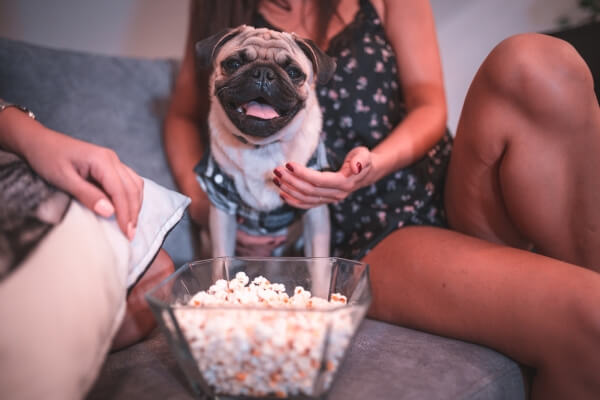
Popcorn can be a fun treat for your pooch — as long as it’s air-popped and made without any oil, butter, salt, or other added ingredients that may increase the sodium or fat content.
Bags of microwave popcorn should be avoided — they will have many artificial flavorings, preservatives, and chemicals, which can be harmful to your pup’s health.
And, always remove unpopped kernels before feeding to your pup as they may cause choking. Plus, your pooch won’t be able to digest them — the hard texture can damage a dog’s teeth (just like it can humans) or catch their gums.
Can Dogs Eat Cornstarch?
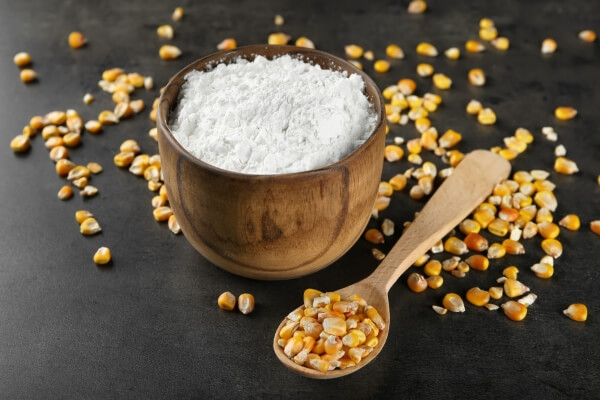
Yes, there’s nothing toxic to a dog found in cornstarch and products made with it should be perfectly safe for your pup, depending on the other ingredients used. For example, avoid anything that includes well-known toxins for dogs, like onion or garlic.
Can Dogs Have Cornflakes?
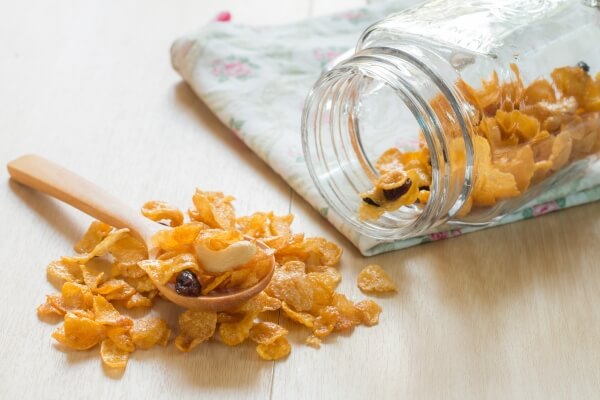
If your pooch has a habit of “hoovering” up any spilled cornflakes in the morning before you get a chance to clear it up — don’t worry, a bite or two isn’t going to hurt.
However, don’t give your pup a bowl for breakfast as they’re fairly high in carbohydrates and feature added sugars, especially the frosted flakes.
How Much Corn Can Dogs Eat?
It’s always important to consider the portion size to help your dog maintain a healthy, balanced diet. Too much of a good thing, in this case, corn, can lead to weight gain, digestive upset, and maybe joint or health issues for a dog.
Most vets would agree that treats should only make up 10 percent of your pup’s daily caloric intake.
One cup of raw sweetcorn contains approx 125 calories. So, once you’ve worked out your dog’s daily calorie needs — you can calculate how much corn you can treat them with.
For example, a smaller dog (neutered) who weighs around six pounds will need 238 calories per day, so their treat allowance will be only 21 calories, or two tablespoons of corn. At the other end of the scale, a large dog weighing 70 pounds or over will be able to enjoy a cup of sweetcorn per day.
Final Thoughts
Is corn safe for dogs? Absolutely. Virtually all forms of corn are good for your pooch and safe to feed to them, as long as you remove the husks or strip from the cob first. Corn can be a tasty and nutritious treat for dogs if given in moderation and off the cob.
Next time somebody asks, can dogs eat corn, the question should really be, why wouldn’t you give your pup corn? Packed with antioxidants, vitamins, minerals, and fatty acids beneficial to your pup’s health, corn makes a superfood treat for your beloved pup — and it’s pocket-friendly too!
Can Dogs Eat Corn? FAQs
Can Dogs Eat a Corn Dog?
Although none of the ingredients in a corn dog are toxic to canines, the high levels of fat, salt, and other additives mean they aren’t the healthiest choice for your pooch. Dogs that regularly consume excessive fat put themselves at risk of pancreatitis and other health issues, while excess salt can lead to sodium poisoning.
Can Puppies Eat Corn?
It’s never a great idea to feed just-weaned puppies with any type of solid, human food until their digestive systems have had time to adapt to a balanced and nutritious diet. Too much fiber, like found in whole grains such as corn may upset their stomachs and cause vomiting and diarrhea.
Can Dogs Eat Kettle Corn?
No. Kettle corn (sweetened) isn’t ideal for dogs. However, if air-popped (made without oil) plain — yes they can.
Can Dogs Eat Baby Corn?
Baby corn is simply corn that’s been harvested before it matures into a regular-size corn on the cob. Although the tiny ”cob” isn’t as large or tough enough to cause a choking hazard, baby corn should still be chopped into small pieces before feeding to a dog, especially smaller or medium canines.
Additionally, baby corn often comes canned or in brine. So similarly to canned sweetcorn, it may be loaded with salt and other additives — and not a good choice for your canine’s health.
What Other Whole Grains Can Dogs Eat?
Being omnivores, dogs can digest both meat and plant-based proteins. Healthy grains you can include in your canine’s diet include
Brown rice.
Quinoa.
Oats.
There is some debate among dog nutritionists about whether dogs should be eating grains, but it's mainly down to the allergens associated with this food group i.e. gluten or soy, etc. So, try to avoid grains such as wheat, barley, and soy. If in doubt, consult a vet who can put your dog on an allergen elimination diet to find out what your pooch may be sensitive to.
What Vegetables Can Dogs Eat?
Did you know — corn can be classified as both a grain and a veggie? The difference depends on when the corn was picked/harvested. Other dog-suitable veggies that join the ranks of corn include:

